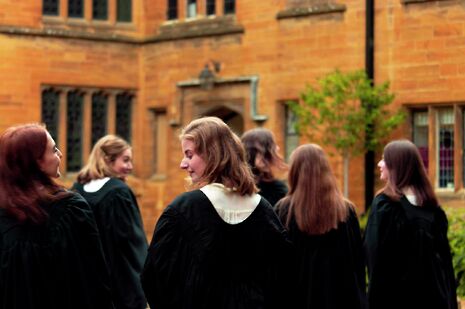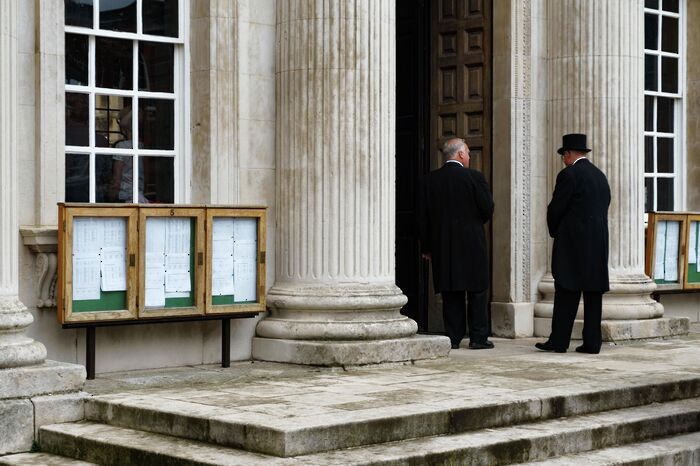The lack of a proper freshers’ week at Cambridge sets an alarming precedent
A five-day Freshers’ Week is just another sign that Cambridge refuses to adapt to the needs of its students, argues Emma Turner

Four days after arriving in Cambridge, barely unpacked and already exhausted, I was having my first ever essay crisis: I had just been given a 2000-word assignment on a 19th century French book I hadn’t yet finished reading, to be handed in in just a few days’ time.
Lectures had not yet begun, freshers’ events had not finished, but there I was in the library. This was the first essay crisis of many, but it was one which set a dangerous precedent. Such an early piece of substantial work – accompanied by initial translation tasks, introductory meetings and the never-ending reading list – seemed like a clear message that work should come (temporally and figuratively) before fun, before society meetings, before my own wellbeing while settling into a new home. The lack of a proper freshers’ week is borderline irresponsible in this sense: students, many of whom have never lived away from home before, should not be sent the message that they are expected to juggle and catch everything before they’ve even settled in.
Choosing between work, socialising and mental health during freshers’ week also sets up unhealthy expectations for the year to come
Whether a college’s welcome events stretch beyond the opening Tuesday of full term is somewhat irrelevant – even if the events do not end within the first few days, the work inevitably starts up during that time. Of course, incoming freshers are unlikely to expect the work at Cambridge to be easy, and nor would they expect to have the first week of term completely free for fun and socialising. But they should not expect to have to turn down several social events in the first few days out of sheer impostor-syndrome-driven panic. In the face of their very first deadline at the most prestigious university in the country, it’s understandable that some students feel they need to make a premature decision: burn out trying to juggle everything, face the wrath of a disappointed supervisor, or prioritise proving themselves academically over settling themselves mentally.
The pressure of a freshers’ week in which we must continually choose between work, socialising and mental health also sets up unhealthy expectations for the year to come; expectations which lead you to believe that spending the night before a deadline in the library until 3am is normal. It would take until exam term for me to realise that such night-time essay dramas weren’t necessary, that these habits were, in fact, counterproductive, and I would work a lot more efficiently by giving myself breaks to be human and have fun. But I should have been given the time to find my footing and make this discovery from the outset.
“Our ‘freshers’ five days’ are just another symptom of a university which is yet to adapt to facilitate equality of opportunity for all its students.”
These expectations can weigh equally on physical health, particularly in freshers’ week when the dreaded flu hangs in the air, waiting to strike the unsuspecting bodies who run from one venue to the next. Ferociously burning the candle at both ends, attending our very first lectures in the morning, then trying to get to know our new college friends in the evening, it’s no wonder so many of us fall ill. In my case, a bad case of freshers’ flu treated with a fear-driven work ethic rather than a few nights of quality sleep escalated into successive bouts of laryngitis, tonsillitis, and conjunctivitis, interspersed with a sharp lapse into depression. I didn’t get physically well again until the New Year, and the first night back at home, I slept for 12 hours straight. My case isn’t an uncommon one.
Moreover, our painfully short freshers’ ‘week’ is the beginning of our very own ’Stanford Duck Syndrome’: looking around, we know that all of our peers also have plenty of work to be doing, but they also seem to be attending three different societies, playing a sport, making plenty of new friends, and getting a good night’s sleep, too. Far too often, achieving such a balance is not possible: sacrifices must be made. Convinced this is simply part of the “Cambridge experience”, afraid to admit we’re not coping, we paddle frantically onwards with a smile on our face and a #blessed in our Instagram captions.
Of course, the main argument for this curtailed freshers’ ‘week’ is likely tradition: with lectures starting on Thursdays, and only eight weeks in which to cram in almost half a syllabus, no doubt Cambridge feels that either using Week One to begin gently or giving students a week and a half before term starting would be wasteful and overly generous. But instead of clinging so tightly to the chaos of our 8-week sprint, we should use our prized analytical skills to question whether this tradition is suited to the needs of today’s students, or if it merely adds to harmful stereotypes surrounding the University’s culture which may serve as a deterrent for talented but disadvantaged students wishing to make an application.
Our ‘freshers’ five days’ are just another symptom of a university which is yet to adapt to facilitate equality of opportunity for all its students. We must rethink traditions which are harming an already precarious work-life balance, and communicate efficiently to foster healthy expectations for freshers across all colleges.
 News / Cambridge study finds students learn better with notes than AI13 December 2025
News / Cambridge study finds students learn better with notes than AI13 December 2025 News / Cambridge Vet School gets lifeline year to stay accredited28 November 2025
News / Cambridge Vet School gets lifeline year to stay accredited28 November 2025 Science / Did your ex trip on King’s Parade? The science behind the ‘ick’12 December 2025
Science / Did your ex trip on King’s Parade? The science behind the ‘ick’12 December 2025 News / Uni Scout and Guide Club affirms trans inclusion 12 December 2025
News / Uni Scout and Guide Club affirms trans inclusion 12 December 2025 Arts / Modern Modernist Centenary: T. S. Eliot13 December 2025
Arts / Modern Modernist Centenary: T. S. Eliot13 December 2025









